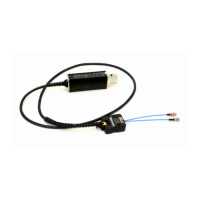The above example code creates a script named test7 that displays text on the front panel and lists the script
with the following output:
loadscript test7
display.clear() display.settext("Hello from my test")
endscript
Also see
Load a script by sending commands over the remote interface (on page 8-4)
Retrieve source code one line at a time (on page 8-80)
scriptVar.name
This attribute contains the name of a script in the runtime environment.
Details
When setting the script name, this attribute renames the script that the variable scriptVar
references.
This attribute must be either a valid Lua identifier or the empty string. Changing the name of a script
changes the index that is used to access the script in the script.user.scripts table. Setting the
attribute to an empty string removes the script from the table completely, and the script becomes an
unnamed script.
As long as there are variables referencing an unnamed script, the script can be accessed through
those variables. When all variables that reference an unnamed script are removed, the script is
removed from the runtime environment.
If the new name is the same as a name that is already used for another script, the name of the other
script is set to an empty string, and that script becomes unnamed.
Changing the name of a script does not change the name of any variables that reference that script.
The variables still reference the script, but the names of the script and variables may not match.

